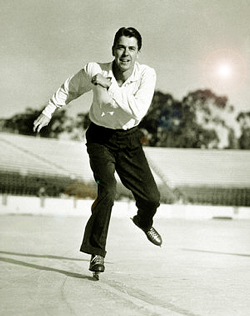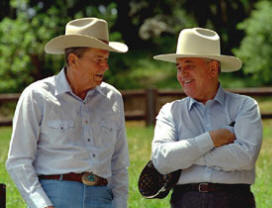|

Ronald Reagan 1911-2004
From 1981 to 1989 former actor
Ronald Wilson Reagan led the United States as their 40th president. Some say John Wayne
should've been given a chance as well.
|
|
Ronald married actress
Nancy Davis
in 1952.
Busy actor Ronald Reagan also worked as a radio
announcer, sport commentator, and spokesman for General Electric.
In 1962, Reagan left the Democrats and
joined the Republicans.
|
On October 27, 1964, and in support of the Republican presidential
candidate Barry Goldwater, Ronald Reagan delivered his
nationally televised
 A Time for Choosing speech.
A Time for Choosing speech.
Although Democrat
 Lyndon B. Johnson won
the race, Reagan's speech put him on the map and he switched from
actor to full time politician.
Lyndon B. Johnson won
the race, Reagan's speech put him on the map and he switched from
actor to full time politician.
Here you can
 check the election results.
check the election results.
Reagan was governor of California from 1967 to 1975.
First Term
On January 20, 1981, Ronald
Reagan delivered his
 First Inaugural Address. The chaps at the Inauguration desk
inform us that "Reagan's Inauguration broke tradition by taking
place on the west front terrace of the U.S. Capitol, rather than the
east front. The west front could accommodate more visitors."
First Inaugural Address. The chaps at the Inauguration desk
inform us that "Reagan's Inauguration broke tradition by taking
place on the west front terrace of the U.S. Capitol, rather than the
east front. The west front could accommodate more visitors."
Reagan's Vice President was
 George H.W. Bush.
George H.W. Bush.
Reagan visited Europe. On June 8, 1982, and after going
horseback riding with the Queen on the Windsor Castle grounds in the
morning, Ronald Reagan delivered his
 Address to Members of the British Parliament in London.
Address to Members of the British Parliament in London.
On March 8, 1983, Reagan delivered his
 Evil Empire speech at the Annual Convention of the National
Association of Evangelicals in Orlando, Florida. He combined his
visit with a Republican fundraiser later that day.
Evil Empire speech at the Annual Convention of the National
Association of Evangelicals in Orlando, Florida. He combined his
visit with a Republican fundraiser later that day.
US-Soviet relations reached a new low when, on August 31, 1983, a
South Korean jumbo jet, en route from Alaska to Seoul, was pursued
by three Soviet MiG 23 fighter planes and shot down at an altitude
of about six miles near the Soviet island of Sakhalin. The Korean
Air Lines jumbo carried 269 people, 61 of which were Americans
including one U.S. congressman.
On October 25, 1983, the United States invaded the island nation of
Grenada in the Caribbean Sea,
after a military coup had toppled its government and had killed its
prime minister, Maurice Bishop,
earlier that month.
Reagan justified the invasion with
American fear that Grenada would become a Soviet outpost. Grenada
had been independent since 1974 but kept the British monarch as the
nominal head of state.
The US invasion, therefore, left
Britain somewhat miffed. Moreover,
Mrs.
Thatcher's foreign policy adviser, Anthony
Parsons, concluded that "it is becoming
increasingly obvious that” the United States
“had been planning the Grenada move for some
time” and that “some plain speaking" with
the Americans was needed.
Read the NY
Times article
 Documents Show
Thatcher-Reagan Rift Over U.S. Decision to
Invade Grenada, published
July 31, 2013
Documents Show
Thatcher-Reagan Rift Over U.S. Decision to
Invade Grenada, published
July 31, 2013
A big anniversary came up and that was
the 40th anniversary of the Normandy Invasion, probably the most
famous D-Day. On June 6, 1984, Reagan was in France and delivered
his
 D-Day Speech, unveiled memorial plaques, and greeted
veterans.
D-Day Speech, unveiled memorial plaques, and greeted
veterans.
Second Term
Ronald Reagan defeated
Democrats Walter Mondale and
 Geraldine Ferraro, and
on January 21, 1985, he delivered his
Geraldine Ferraro, and
on January 21, 1985, he delivered his
 Second Inaugural Address.
Second Inaugural Address.
Why on the 21st and not on the 20th as
usual? Let's ask the pros at Washington:
Because January 20, 1985 fell on a
Sunday, the public Inauguration ceremony was scheduled for Monday,
January 21, 1985.
Reagan was sworn in privately on January 20. Owing
to record cold temperatures on January 21, 1985, however, the public
Inauguration ceremony was moved indoors to the Rotunda, and became a
semiprivate ceremony.
By the way, Reagan's second Inauguration
was the coldest on record. (His first in 1981 was the warmest.)
On January 28, 1986, space shuttle
Challenger exploded shortly after its launch at Cape Canaveral,
Florida. At 5 pm that day, Ronald Reagan gave his
 Address on the
Challenger Disaster.
Address on the
Challenger Disaster.
ASSASSINATION
ATTEMPTS ON RONALD REAGAN
An
assassination attempt was made on March 30, 1981, by John W.
Hinckley Jr., who fired six shots from his Rohm RG-12 .22
revolver in 1.8 seconds from fifteen feet away. Reagan survived
thanks to his bodyguards and a speedy transport to the hospital. No
one was killed in this incident. Hinckley ended up in a mental
hospital.
On May 5, 1986, and just minutes before
Reagan's arrival at the Tokyo Summit, Japan, five rockets were fired
at the meeting site from an apartment two miles away. The Middle
Core Faction terrorist group claimed responsibility.
 Check out Assassinations
in History.
Check out Assassinations
in History.
REAGAN AND COMMUNISM
Similar to tuffbone
 Margaret Thatcher, Ronald
Reagan didn't have much patience for
Margaret Thatcher, Ronald
Reagan didn't have much patience for
 Communism
in general and the
government of the Soviet
Union in particular.
Communism
in general and the
government of the Soviet
Union in particular.
It took
 Mikhail Gorbachev's glasnost policies
to soften Ronald's opinion.
Mikhail Gorbachev's glasnost policies
to soften Ronald's opinion.
And it looked like this:

GLASNOST IN ACTION
Copyright AP/WWP
In 1987, Reagan delivered his
 Brandenburg Address at the
Brandenburg Address at the
 Berlin Wall,
asking Gorbachev to bring her down.
Berlin Wall,
asking Gorbachev to bring her down.
Ronald Reagan died of Alzheimer's disease
on June 5, 2004, in Los Angeles, California. The state funeral was
held at the Washington National Cathedral.
Here is Margaret Thatcher's
 Tribute to Ronald Reagan.
Tribute to Ronald Reagan.
And here is the
 Cathedral's page for June 11, 2004.**
Cathedral's page for June 11, 2004.**
** (archived 2016)
Check the
 US Election Map 1796 -
1968.
US Election Map 1796 -
1968.
Check
 Governments in History Chart.
Governments in History Chart.
See also the
 American Timeline.
American Timeline.
More History
|